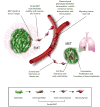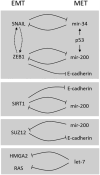The epigenetics of epithelial-mesenchymal plasticity in cancer
- PMID: 24202396
- PMCID: PMC4190672
- DOI: 10.1038/nm.3336
The epigenetics of epithelial-mesenchymal plasticity in cancer
Abstract
During the course of malignant cancer progression, neoplastic cells undergo dynamic and reversible transitions between multiple phenotypic states, the extremes of which are defined by the expression of epithelial and mesenchymal phenotypes. This plasticity is enabled by underlying shifts in epigenetic regulation. A small cohort of pleiotropically acting transcription factors is widely recognized to effect these shifts by controlling the expression of a constituency of key target genes. These master regulators depend on complex epigenetic regulatory mechanisms, notably the induction of changes in the modifications of chromatin-associated histones, in order to achieve the widespread changes in gene expression observed during epithelial-mesenchymal transitions (EMTs). These associations indicate that an understanding of the functional interactions between such EMT-inducing transcription factors and the modulators of chromatin configuration will provide crucial insights into the fundamental mechanisms underlying cancer progression and may, in the longer term, generate new diagnostic and therapeutic modalities for treating high-grade malignancies.
Figures





References
-
- Polyak K, Weinberg RA. Transitions between epithelial and mesenchymal states: acquisition of malignant and stem cell traits. Nat Rev Cancer. 2009;9:265–273. - PubMed
-
- Thiery JP, Acloque H, Huang RY, Nieto MA. Epithelial-mesenchymal transitions in development and disease. Cell. 2009;139:871–890. - PubMed
-
- Katoh Y, Katoh M. Hedgehog signaling, epithelial-to-mesenchymal transition and miRNA. Int J Mol Med. 2008;22:271–275. - PubMed
Publication types
MeSH terms
Substances
Grants and funding
LinkOut - more resources
Full Text Sources
Other Literature Sources

